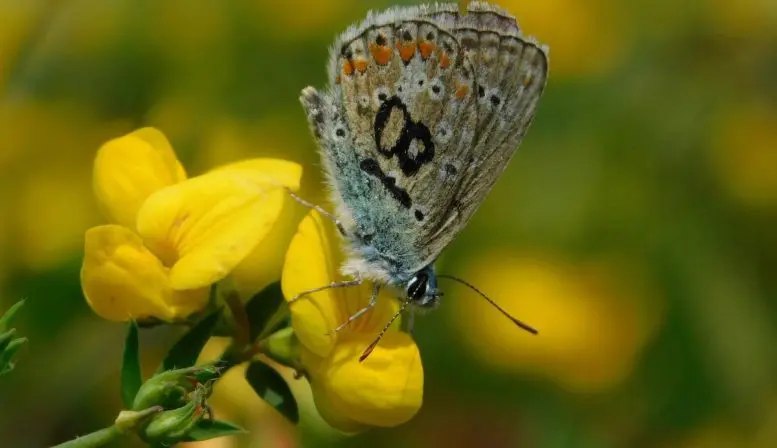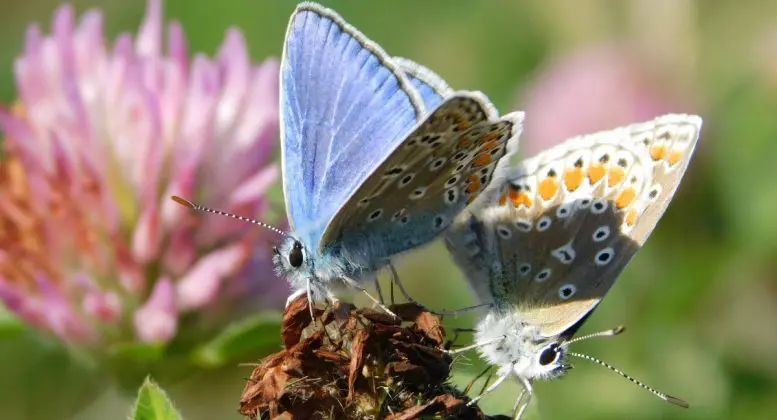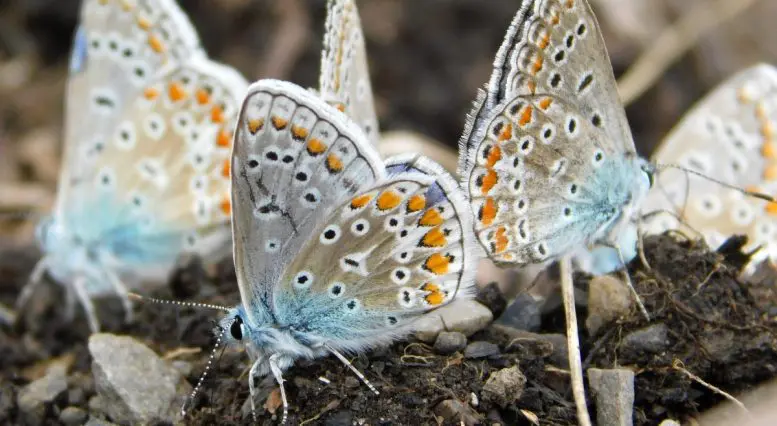This summer, if you see a butterfly with wings that are blue on top with orange spots underneath, you may have crossed paths with a male European Common Blue (or Polyommatus icarus), a newly introduced species in Canada.
Could it be a fluke? Probably not, according to a group of researchers from the University of Ottawa who have taken a close look at this captivating blue creature. They are in fact the first to study its ecology.
“The results of our study suggest that the Polyommatus icarus (P. icarus) could become widespread in the future since it prefers urban areas,” said uOttawa PhD student Stephanie Rivest, who is the first author of the article “Anthropogenic disturbance promotes the abundance of a newly introduced butterfly, the European common blue (Polyommatus icarus; Lepidoptera: Lycaenidae), in Canada” published in the Canadian Journal of Zoology.
“It can reach extremely high densities and its caterpillars depend on a host plant that is ubiquitous across Canada.”
A new home
Commonly found in Europe, P. icarus was discovered near Montreal, Québec in 2005. Its introduction provided Rivest’s team with a rare opportunity to study a non-native insect during the early stages of its colonization and gain further insights into the progression of an invasion.

Polyommatus icarus on Birds Foot Trefoil marked with an identification number used during Rivest’s study. Credit: Stephanie A. Rivest
“The rate that animal and plant species are being introduced beyond their home ranges is increasing globally, but only a few of these species will become invasive – which means they are widespread, abundant, and have negative effects on ecological communities,” explained Rivest. “That’s why it’s so important for newly introduced species to be studied, like we did here, so that we can better understand and predict which introduced species are likely to become invasive.”
Predicting the spread
“We found that P. icarus is most abundant in urban areas and where its preferred caterpillar food plant, Birds Foot Trefoil (Lotus corniculatus), is found,” said Rivest. “This plant was introduced to North America in the mid-1700s and can now be found in every Canadian province.”
“Our study also shows that P. icarus can reach extremely high densities relative to native butterflies and that it is a low-moderate disperser – that is, adults are not great fliers,” explained Rivest.
This butterfly might not win a flying contest, but it could still become widespread in Canada.
“Building on our initial assessment of P. icarus, we need future studies to model the predicted trajectory of range expansion and to investigate other potentially important factors,” added Dr. Heather Kharouba, Associate Professor in the Department of Biology at the University of Ottawa and head of the lab where the research was conducted.
A population on the rise
When the study began in 2017, the European Common Blue (Polyommatus icarus) could only be found in southwestern Québec. That’s where Rivest and her colleagues conducted their field surveys. They collected information about butterfly communities and their habitat in several sites, and later measured the ability of P. icarus adults to fly. To do that, they marked as many P. icarus individuals as possible with a permanent marker.
“Each individual received a unique marking on their wing so that if they were ever recaptured, we could measure the distance they flew,” said Rivest. “We captured and marked an astounding number of individuals, 4629 to be exact!”
These butterflies have now found their way outside of Québec.
“Since our study began in 2017, there has been an increase in the number of P. icarus observations on citizen science websites like eButterfly and iNaturalist,” said Stephanie Rivest. “These observations suggest that P. icarus has expanded its range since individuals can now be found in Toronto, over 400 km away from our study region.”
“We encourage the public to contribute to the monitoring of P. icarus by uploading their observations of this easy to identify butterfly species.”
Reference: “Anthropogenic disturbance promotes the abundance of a newly introduced butterfly, the European common blue (Polyommatus icarus; Lepidoptera: Lycaenidae), in Canada” by Stephanie A. Rivest and Heather M. Kharouba, 19 July 2021, Canadian Journal of Zoology.
DOI: 10.1139/cjz-2021-0009







